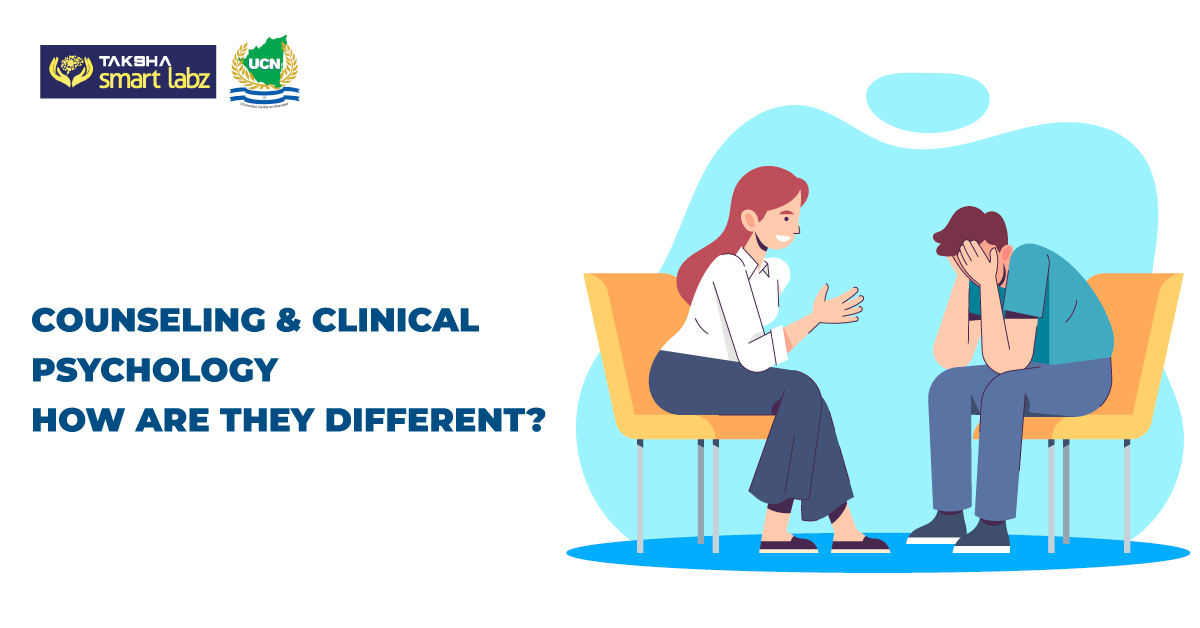Blog Summary
Counseling and clinical psychology are different branches within the mental health domain. There is a subtle difference. Students who wish to branch out and specialize should understand their differences to decide what suits them best regarding their career objectives unambiguously. Clinical psychology is a branch of psychology that deals with assessing and treating mental illnesses and behavioral problems. A clinical psychology practitioner called a psychologist primarily deals with disorders such as schizophrenia, multiple personalities, depression, etc. They are trained to use their education and experience to do psychoanalysis after they have assessed and done an evaluation on the patient. They decide the treatment modality according to the diagnosis and the expected treatment outcome.
For most of us, especially students moving forward to pursue a doctorate in the field of mental health, the branches of counseling and clinical psychology are more often similar than not. We are often biased about what they mean, what these fields may branch into, imply and offer a career focus. Read on to find out what both the disciplines are all about and what may be the right choice for you.
- How do clinical and counselling psychologists compare?
- How does clinical and counselling psychology differ?
- Which is better clinical psychology or counselling psychology?
- Which is better, clinical or counselling psychology?
This article is an outline and a guide to help you understand the similarities and differences between clinical and counseling psychology. We hope this article answers all the questions listed above.
Clinical Psychology
What is clinical psychology? It is the branch of psychology that deals with assessing and treating mental illnesses and behavioral problems. When a person needs psychological and evaluation, a clinical psychologist plays the part and deals with disorders such as schizophrenia, multiple personalities, depression, etc.
Clinical psychologists use psychoanalysis after an assessment and evaluation. A clinical psychologist determines the severity and nature of the mental illness after a detailed study. They decide the treatment modality according to the diagnosis and the expected treatment outcome.
Clinical psychologists are sometimes assigned to patients by a physician or with a court recommendation to deal with the problems that a physician has diagnosed. Healthy individuals who have no or limited pathological mental issues are the focus of attention for clinical psychologists.
A clinical psychologist focuses on those patients who have been diagnosed with a severe mental illness. In today’s time and age, clinical psychologists have partaken some of the work, usually in the realm of psychiatry. Still, both streams are involved in a great deal of research and supervision activities.
In clinical psychology, the learners focus on psychoanalytic persuasions, a critical analysis of these processes, and behavioral issues. It implies the reaction of the individual and the society surrounding the client. The field of clinical psychology looks at psychotherapy from more of a generic healthcare perspective. Clinical psychologists receive training to identify, diagnose, and treat psychological conditions. This training is very similar to how a doctor would diagnose and treat medical conditions that belong to the physical realm.
Clinical psychologists use diagnostic tests, assessments, and inventories to identify psychological conditions, including emotional and behavioral disorders. According to the United States Bureau of Labor Statistics, some subspecialties of clinical psychology include health psychology and neuropsychology.
Clinical psychology programs are always more research-oriented and require many hours of counseling, even as you are pursuing the course. It is a requirement for the programs to have a certain fixed number of hours of the internship experience.
Counseling Psychology
Counseling psychology is the treatment of the problems of everyday life through proper communication and understanding. Unlike clinical psychology, counseling involves mentally healthy individuals who need help with certain areas of their lives and seek professional help in that regard. It emphasizes and deals with the current status of a person’s life and the current events in the patient’s life.
Counseling psychology focuses on a person’s thought process and how they can deal with a particular situation effectively and positively by getting a professional opinion. Counseling psychology is a branch on its own, and a physician’s diagnosis has no interplay. There is no reference needed, and whoever thinks they need help may reach out directly to a counseling psychologist and book a session.
A counseling psychologist provides opinions on dealing with daily life issues effectively, improving communication with society, enhancing mental health, and improving existing social relationships. A counseling psychologist will teach new coping and survival strategies and help to draw resources, such as personal support and community services that they can use for personal improvement and deal better with society in the process.
Counseling psychologists deal with people struggling with depression and anxiety. At the same time, they work with them extensively, work with the clients to address life changes, deal with crises that may persist, combat stresses and traumas that might trigger the development of these issues. Counseling psychology degree programs focus on psychotherapy, as do their clinical psychology colleagues.
According to the American Psychological Association, counseling programs aim to utilize multicultural and cultural training methods to prepare aspiring professionals to work with clients of varying ethnicities and cultures. Counseling psychologists help patients with life events that contribute to or exacerbate psychological disorders. They work with individuals who have a diagnosable mental illness.
Clinical vs. Counseling Psychology
Both of these disciplines are sciences of the mind and are meant to better a person as an individual but vary significantly in how they deal with the types of issues they encounter. There is a requirement for professionals to specialize in streamlining their field of practice.
A counseling psychologist leans towards the societal, humanistic, and client-centered practices that have evolved. In theory, clinical psychologists adopt psychodynamic research, in contrast to counseling psychologists whose approach was towards cognitive behavior.
Counseling psychology involves working with people on an individual and personal level, sending time to analyze their situation. Most often, counseling psychologists encounter clients who want someone to listen. They want to feel important and acknowledged. The counseling and therapy come next for the client.
In a corporate setting, a counseling psychologist will play an essential role in vocational and career assessment. In contrast, a clinical psychologist aims at projective assessment training.
So, suppose you think you are a people person willing to work within individuals, groups, and communities.
In that case, counseling psychology may be the one for you. On the other hand, clinical psychology involves studying how the brain functions as an organ and how those changes affect an individual’s behavior and may cause disruptions in everyday psychological attitudes and perceptions.
The training involves arriving at a diagnosis of the existing condition and deciding on the best treatment for the particular client. Clinical psychology represents the largest subspecialty of psychologists. It involves research, assessment, intervention, and consultation as applied to the betterment of those who may need your services.
Despite the many differences, these two disciplines overlap and share several common goals concerning helping clients get better from where they are today.
- Both of these professionals work with a variety of conditions and with those from very diverse backgrounds.
- Both of them attend to clients/ patients in private clinics, health centers, mental health facilities, and personal therapists. They work with clients with varying degrees of severity of the conditions.
When you try to choose between the two disciplines, you must know what you may be looking for. For instance, if your interest is more towards communication, logical analysis of a critical situation, and arriving at a science-based decision, counseling psychology may be the right choice for you.
A PhD in Counseling Psychology
It will entail and expect you to:
- Bestow advanced knowledge in the field with best practices in the field of counseling psychology.
- Create a substantial body of evidence and practice from it
- Acquire and establish a leadership role at the community, professional, and university organizational level in counseling psychology.
A PhD in Clinical Psychology
The following are attributes where clinical psychology differs from a PhD in counseling psychology.
- It is focused and founded on research.
- The study will be in developing research ideas, conduct experiments and analyze such data.
- The degree requires submitting a doctoral dissertation and defending your thesis.
Depending on what country and university you plan to enroll for a doctorate program, the requirements for admission and the process will vary. Do refer to the relevant university website and country regulations before embarking on your journey to earn a PhD.













